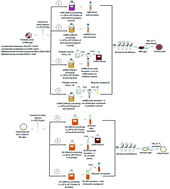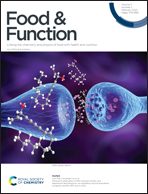Effects of regular and decaffeinated roasted coffee (Coffea arabica and Coffea canephora) extracts and bioactive compounds on in vitro probiotic bacterial growth
Abstract
The aim of this study was to investigate the effects of coffee species, roast degree and decaffeination on in vitro probiotic bacterial growth, and to identify the major coffee compounds responsible for such effects. Six C. arabica and C. canephora extracts (regular medium and dark roasted and decaffeinated medium roasted), and five bioactive compounds (chlorogenic acid, galactomannan, type 2 arabinogalactan, caffeine and trigonelline) were individually incorporated into a modified low-carbon broth medium-(mMRS), at different concentrations (0.5 to 1.5% soluble coffee and 0.05 to 0.8 mg mL−1 standard solutions). Inulin and fructooligosaccharides (FOS) were used as prebiotic references. MRS and mMRS were used as rich and poor medium controls, respectively. The growth of Lactobacillus rhamnosus GG ATCC 53103-(GG), L. acidophilus LA-5-(LA), Bifidobacterium animalis DN-173010-(BA) and B. animalis subsp. lactis BB12-(BB12), as well as the growth inhibition of non-probiotic Escherichia coli ATCC 25922 were evaluated. Differences in growth between mMRS and treatments (Δlog CFU mL−1) were compared by ANOVA and Tukey's test, and considered when p ≤ 0.05. Overall, after 48 h incubation, the medium roasted arabica coffee extract increased the growth of GG, LA and BA (range: Δlog CFU mL−1 = 0.5 to 1.8), while the dark roasted arabica coffee extract increased BB12 growth (range: Δlog CFU mL−1 = 0.9 to 1.7), in a dose dependent manner. Improved performances of GG, LA and BA were promoted by higher polysaccharides and CGA concentrations, with better performance for Lactobacillus sp. The tested coffee bioactive compounds promoted the poor growth of BB12. Plain caffeine did not promote Bifidobacterium sp. growth and limited the growth of Lactobacillus sp. Regular C. arabica and C. canephora extracts inhibited the growth of E. coli, while the decaffeinated extracts promoted its growth. The present results show that coffee consumption can selectively improve the growth of probiotic strains, thus exerting a prebiotic effect, and show that coffee roasting and decaffeination affect this property and that different strains utilize different coffee components to grow.



 Please wait while we load your content...
Please wait while we load your content...